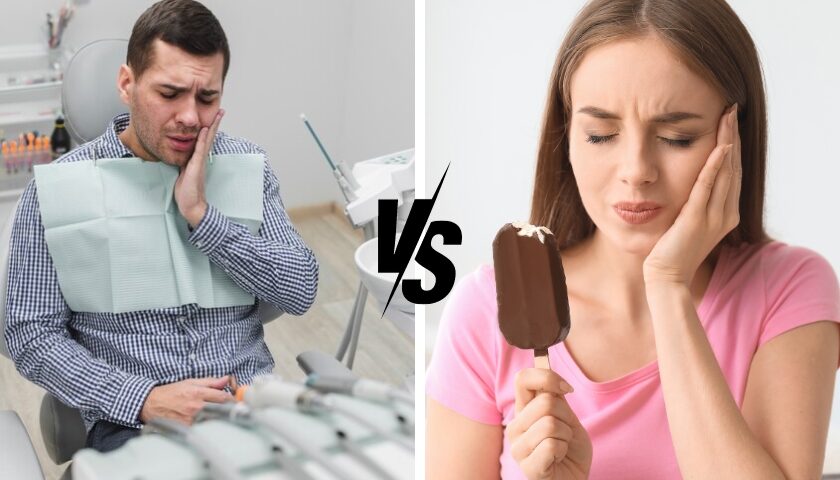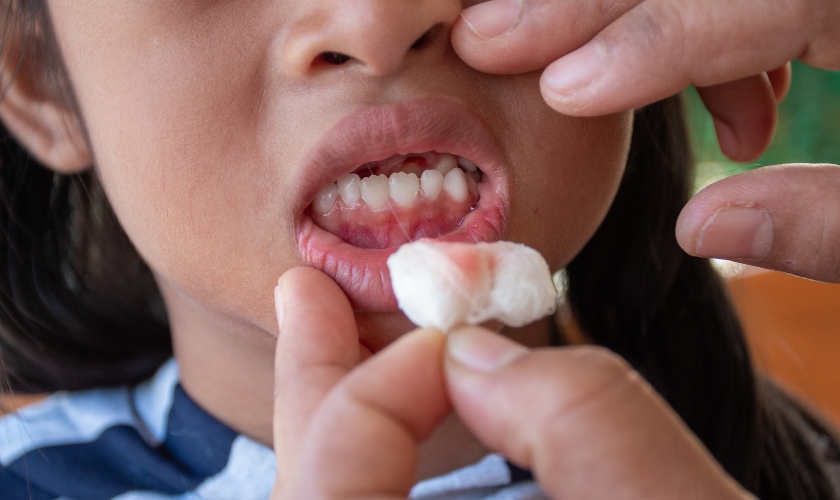What Is The Difference Between A Toothache And A Sensitive Tooth?

At What Age Should A Child Get Invisalign?
November 17, 2023
5 Common Misconceptions About Ceramic Crowns Debunked
November 30, 2023Are you experiencing a sharp jolt of pain whenever you indulge in your favorite ice cream or sip on a warm cup of coffee? Or, perhaps you wake up with an agonizing toothache that seems to have come out of nowhere. It’s time to get to the bottom of this dental dilemma! In today’s blog post, we’re going to unravel the mystery between toothaches and sensitive teeth, ensuring you understand the key differences so you can seek the right solution promptly. So whether you’re searching for an emergency dentist in Olds or simply curious about oral health troubles, keep reading – we’ve got all the information you need right here!
Causes and Symptoms of a Toothache:
A toothache is a multifaceted issue, and recognizing its diverse origins aids in pinpointing the exact problem:
Tooth Decay and Cavities
Decay and cavities occur when harmful bacteria feast on sugars, producing acids that erode enamel. As this process advances, it exposes sensitive dental nerves, causing discomfort that ranges from mild to severe.
Gum Disease
Periodontal conditions like gingivitis or periodontitis can lead to toothaches. The inflammation compromises the supporting structures, causing pain, tenderness, and sometimes, bleeding during brushing.
Infections and Abscesses
Deep-seated infections within the tooth pulp or at the root can lead to abscess formation. The accumulation of pus exerts pressure, resulting in intense, throbbing pain that may radiate to the jaw or ear.
Dental Trauma
Impact or injury, such as a fall or blow to the face, can cause fractures or dislodgment of teeth. The exposed nerves react to stimuli, causing persistent pain and heightened sensitivity.
Impacted Wisdom Teeth
Wisdom teeth, or third molars, may not have sufficient space to erupt properly, causing pain, swelling, and difficulty in cleaning. Infections around these teeth can intensify the discomfort.
Addressing a Toothache:
Immediate Dental Attention
If you’re experiencing a severe toothache, seeking prompt dental care is crucial. An emergency dentist in Olds can assess the root cause and recommend appropriate interventions.
Over-the-Counter Pain Relief
While awaiting professional help, over-the-counter pain relievers can provide temporary relief. Follow package instructions and avoid placing aspirin directly on the affected area to prevent irritation.
Causes and Symptoms of Tooth Sensitivity:
Exposed Tooth Roots
Tooth sensitivity often arises when the protective enamel on the tooth’s surface is compromised, exposing the underlying dentin. Dentin contains microscopic tubules that connect to nerve endings. Exposed tooth roots, usually caused by gum recession or enamel erosion, can lead to heightened sensitivity, especially to hot, cold, or sweet stimuli.
Dental Erosion and Abrasion
Acidic foods and beverages, aggressive brushing, or abrasive toothpaste can contribute to enamel erosion. As the enamel wears away, dentin becomes more susceptible to external stimuli, resulting in tooth sensitivity. Individuals may experience discomfort when consuming acidic foods or while brushing their teeth.
Tooth Decay and Cavities
Early-stage tooth decay may manifest as sensitivity. When decay advances and reaches the dentin, sensitivity intensifies. Cavities compromise the structural integrity of the tooth, and the exposure of dentin contributes to heightened sensitivity, particularly to temperature changes and sugary substances.
Teeth Grinding (Bruxism)
Bruxism, characterized by the grinding or clenching of teeth, can wear down enamel over time. This habitual grinding may expose dentin and lead to tooth sensitivity. Individuals with bruxism may notice increased sensitivity, especially upon waking or during times of stress.
Cracked or Fractured Teeth
Cracks or fractures in the tooth can expose dentin and cause sensitivity. It can occur due to trauma, biting on hard objects, or even from long-term wear. Individuals may feel discomfort when biting or chewing, and sensitivity to temperature changes may become pronounced.
Recent Dental Procedures
After certain dental procedures like teeth cleaning, fillings, or tooth whitening, individuals may experience temporary sensitivity. This sensitivity is usually transient and resolves on its own. It’s important to follow post-treatment care guidelines provided by the dentist to minimize discomfort.
Symptoms of Tooth Sensitivity:
- Sharp, sudden pain: Individuals may experience a quick, stabbing pain in response to specific stimuli.
- Discomfort with Hot or Cold: Sensitivity to hot or cold foods and beverages is a common symptom.
- Painful Brushing: Brushing or flossing may cause discomfort, especially with vigorous or improper techniques.
- Throbbing Pain: Prolonged exposure to triggers can lead to a lingering, throbbing sensation.
Addressing Tooth Sensitivity:
- Desensitizing Toothpaste: Specially formulated desensitizing toothpaste can help alleviate tooth sensitivity over time. Regular use can block pain signals and strengthen enamel.
- Fluoride Treatments: Professional fluoride applications by your dentist can strengthen enamel and reduce sensitivity. They may recommend in-office treatments or prescribe at-home fluoride products.
Differentiating Between the Two:
While both conditions involve dental discomfort, understanding the nature of the pain is key. A toothache tends to be persistent and may indicate an underlying issue, whereas specific stimuli often trigger tooth sensitivity and are generally more fleeting.
In navigating the realm of dental discomfort, recognizing the differences between toothache and tooth sensitivity is pivotal. If you’re uncertain about the cause of your oral pain, consulting with an emergency dentist in Olds ensures a proper diagnosis and tailored treatment plan. Remember, proactive dental care is the cornerstone of a healthy, pain-free smile.




